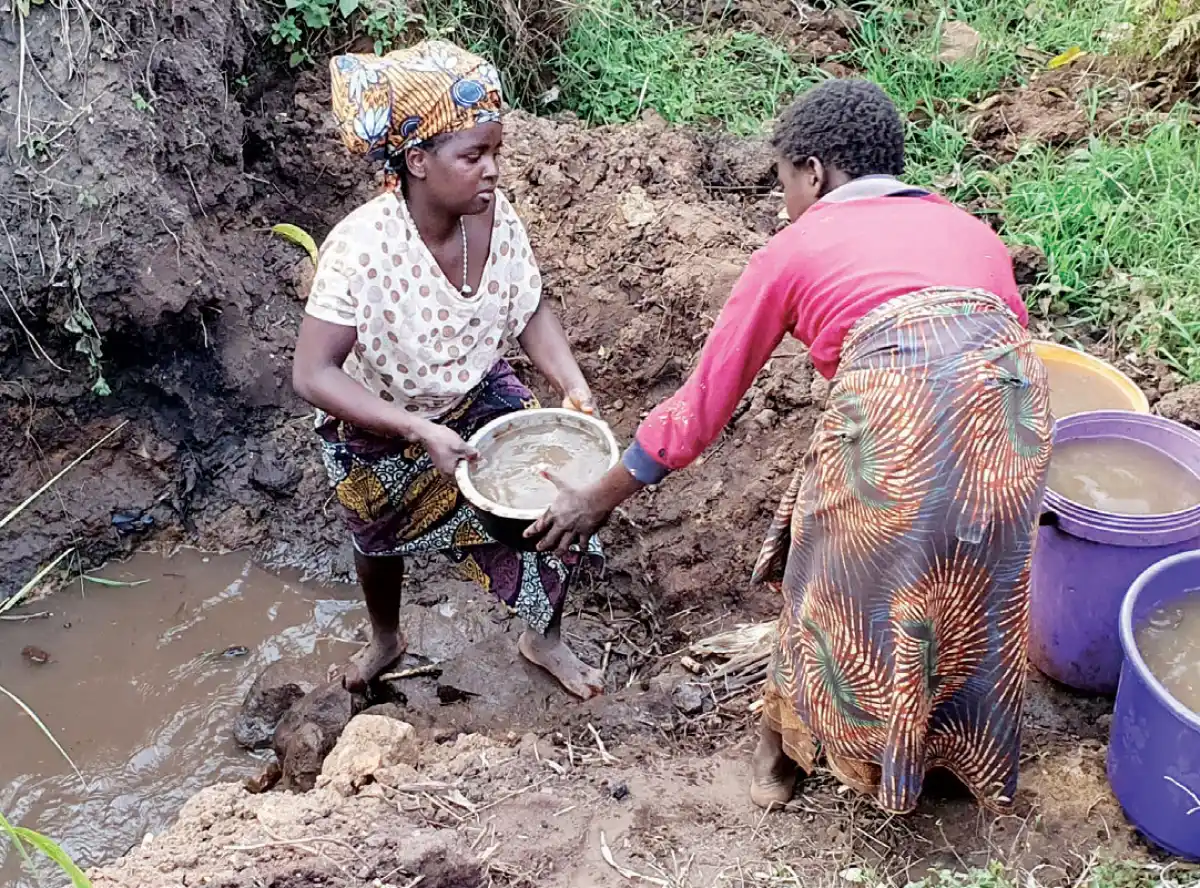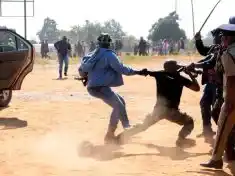
Scrambling for water sourced from a well is the lived experience of the people of Nangumi Village, Traditional Authority Machinjiri, in Blantyre. It is as if every year, parliamentarians do not pass votes for the Ministry of Water and Sanitation, which is tasked to ensure that community members have access to potable water. THOMAS KACHERE writes.
The statistics are alarming. One in three people in Malawi do not have access to clean water, putting people at risk of contracting waterborne diseases such as cholera.
This is despite that access to safe water, sanitation and hygiene is regarded as the most basic human need for health and wellbeing.
In Malawi, the worsening water access crisis is attributed to unsustainable population growth, deforestation and policy misplacement, among other factors.
Due to forest degradation, which has been worsened by practices such as the eternal search for firewood, the extension of farmland and other practices, waters of rivers that once flowed freely dry up at the slightest contact with the sun’s rays.
As a result, the water table is receding, making it difficult for people to access water from sources, including unprotected ones such as wells.
Modesta Nolowadi of Nangumi Village in Blantyre City South East is one of the women that bear the brunt of poor access to water.
The water in question is not even potable, as it is drawn from open sources.
“Every day, I wake up as early as 1am to start the daily search for the commodity.
“This is despite that some of us have school-going children who need us to be home when they are leaving for school. Needless to say they are affected by our absence. We really needy help. Someone has to bail us out of the undesirable situation,” she said.
Nangumi loathes the long time she spends searching for water, a situation made worse by the stiff competition she faces from other water users.
“When I arrive at the well at 10am, I leave it at 3pm because hordes of people wait for their turn on the queue.
“This is compounded by the fact that despite our daily struggles to fetch water from the well to our households, the water is not even safe for human consumption. It is not on that the whole area has one private borehole; needless to say it is located in someone’s compound,” she lamented.

different are we from
animals?
Fostino Kathebwe, who is from the same village, echoed the sentiments.
“We are among the most unfortunate people in Malawi because we depend on one well; hundreds of community members fetching water from this one, open source. Needless to say the water is bad; it is so bad that one cannot differentiate water that has been contaminated with soap and other materials after being used for washing clothes and other items from water that has not been contaminated with such things.
“Now tell me, how different are we from animals?” he queried.
Other reports suggest that families are breaking down as some husbands accuse wives of having secret lovers due to long hours they take at the well.
Meanwhile, health rights activist Maziko Matemba has said it is regrettable that access to clean water remains a challenge in the country.
Matemba said when the government established the Ministry of Water and Sanitation, they had hope that challenges like these would be addressed.
“But looking at reports emanating from some areas in Phalombe, Thyolo and Blantyre Rural, it is clear that there is a lot of work that has to be done.
“We, as advocates, are demanding that the ministry should do the needful because it doesn’t make sense for community members to be drawing water from unsafe sources all their life. Surely, the right to safe water has to be realised in communities,” Matemba said.

According to Matemba, unsafe sources of water can serve as fertile grounds for waterborne diseases such as cholera.
“As you know, we have been having cholera outbreaks in the last few years and we were wondering about its source. Looking at the current situation, it is clear that lack of clean water is among the causes,” he said.
In this year’s budget, the government increased the water budget to assist people access clean water.
Responding to the issue, Water Development and Sanitation Minister Abida Mia said she was aware that several people in the country, including in areas such as Blantyre, Phalombe and Thyolo, are facing challenges to access potable water.
She said the ministry is doing its best to address the problem.
“My ministry is implementing the Solar Powered Groundwater Development Pilot Project and the Groundwater Extraction for Rural Piped Water Development Programme, both financed by the Malawi Government. These projects are targeted at reaching rural areas and other places where water boards are not servicing [people].
“These targeted areas include Blantyre Rural. Efforts are also underway to mobilise financing for extending the Southern Region Water Board service area to reach more people in Thyolo and Phalombe,” Mia said.
She added that they are accelerating efforts, citing the implementation of water and sanitation projects across the country.
The minister said in the Northern Region, for example, they are implementing the Karonga Water and Sanitation Project.
She added that they have just finalised work on the Nkhata Bay Water and Sanitation Project.
“In the Southern Region, we are implementing the Malawi Water and Sanitation Project. This one will improve access to safe water and [lead to] improved sanitation in the City of Blantyre. In Mangochi, we recently finalised a project which is now allowing access to safe water by residents in lakeshore areas,” Mia said.
She said the Government of Malawi, noting the dependency of the economy on water resources and its impact on poverty reduction, considers the conservation, management, development and utilisation of water resources as one of its priorities.
United Nations Sustainable Development Goal number 6 ensures access to water and sanitation for all by the year 2030.
Reports indicate that in rural areas, 37 percent of households spend 30 minutes or more fetching drinking water in comparison to 13 percent in urban areas.
But, as the saying goes, water is life.
As such, scarcity of the commodity is akin to the pronouncement of a death sentence on people who are far from giving up on life.






0 Comments